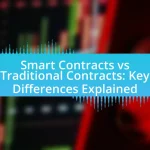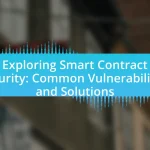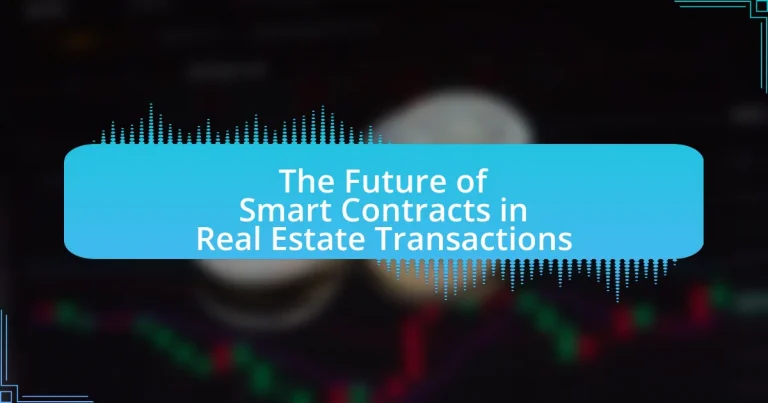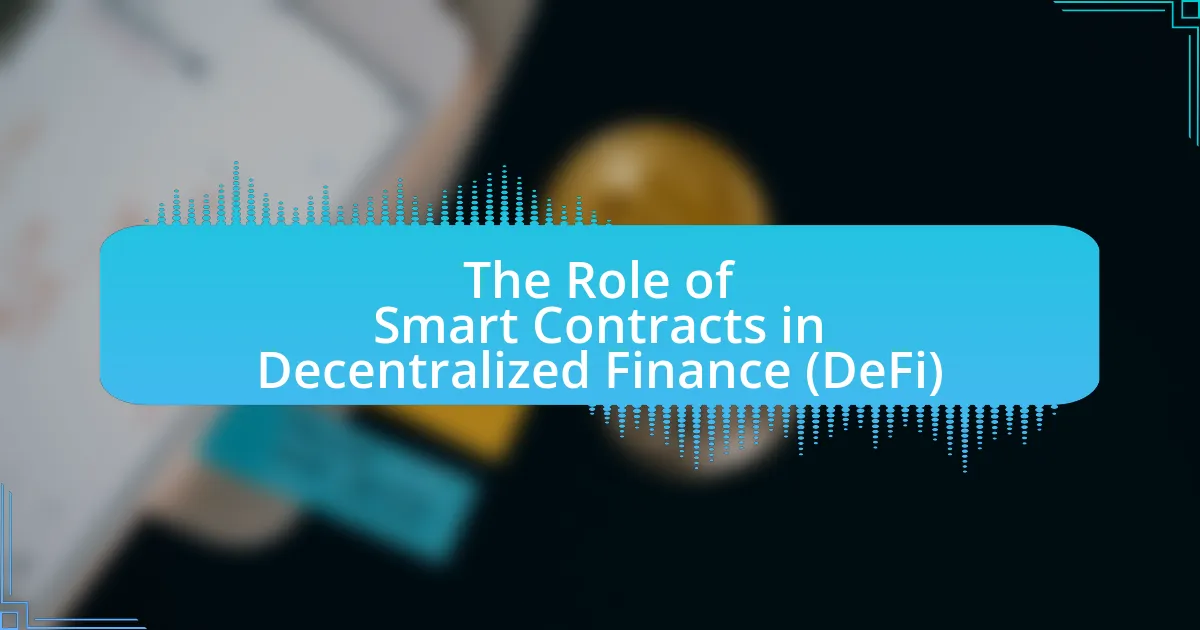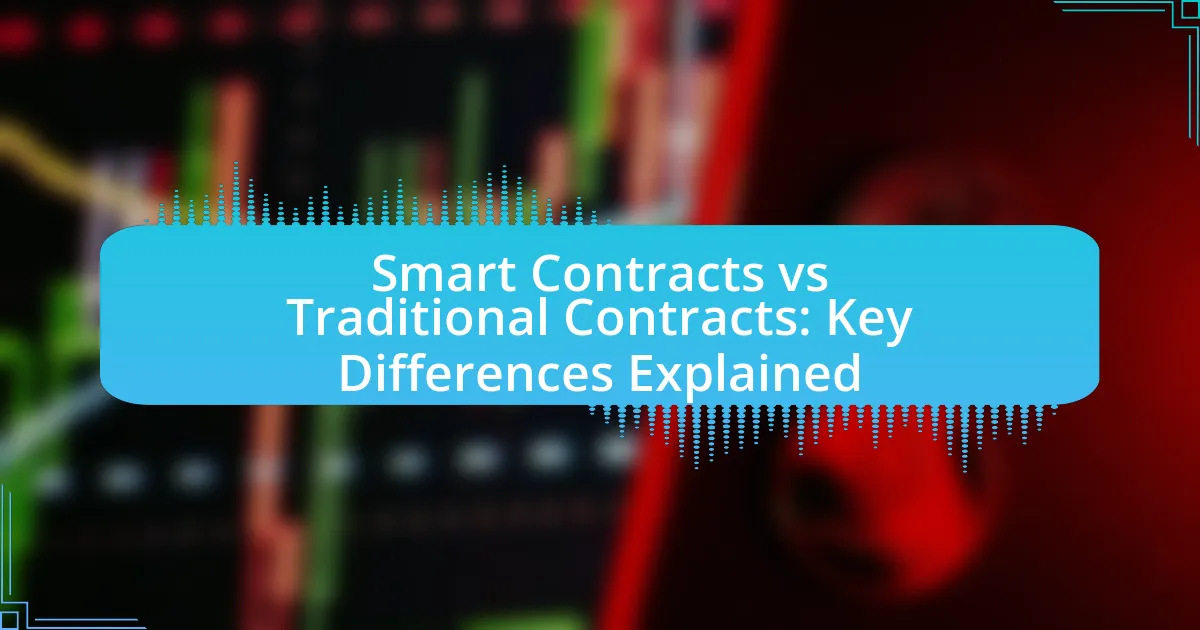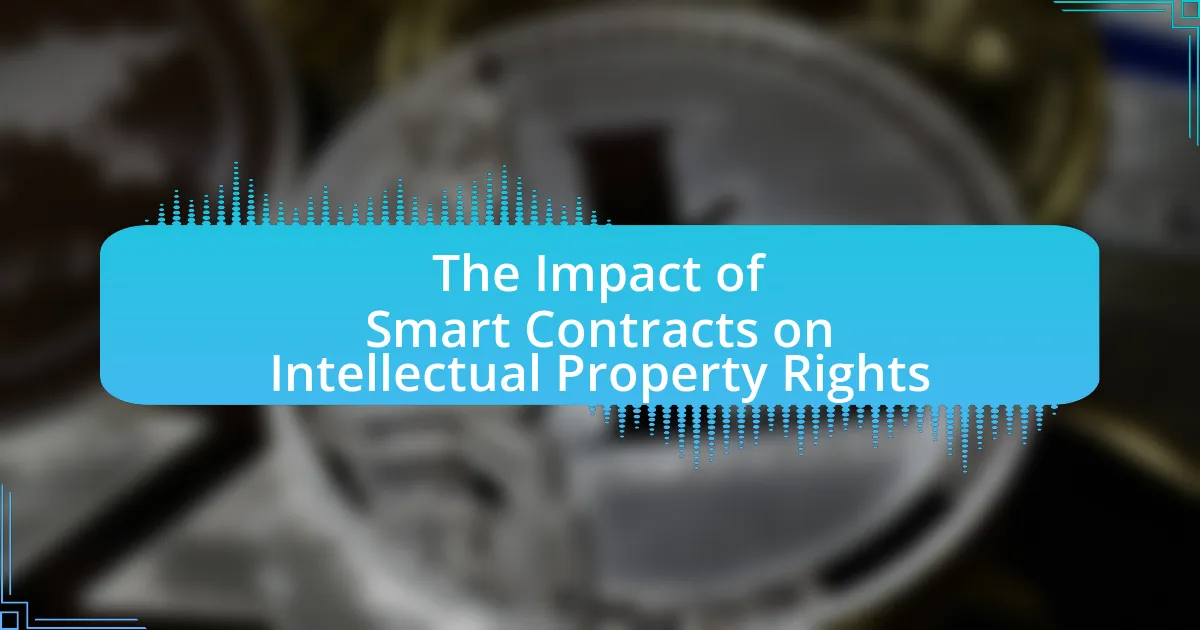Smart contracts are self-executing agreements coded on blockchain technology that automate and secure real estate transactions. This article explores how smart contracts streamline processes such as property transfers, reduce costs by eliminating intermediaries, and enhance transparency through immutable records. Key components of smart contracts, their advantages, and the challenges they face in legal recognition and interoperability are discussed. Additionally, the article examines the future outlook for smart contracts in real estate, emphasizing the potential for technological advancements to further improve efficiency and security in property transactions.
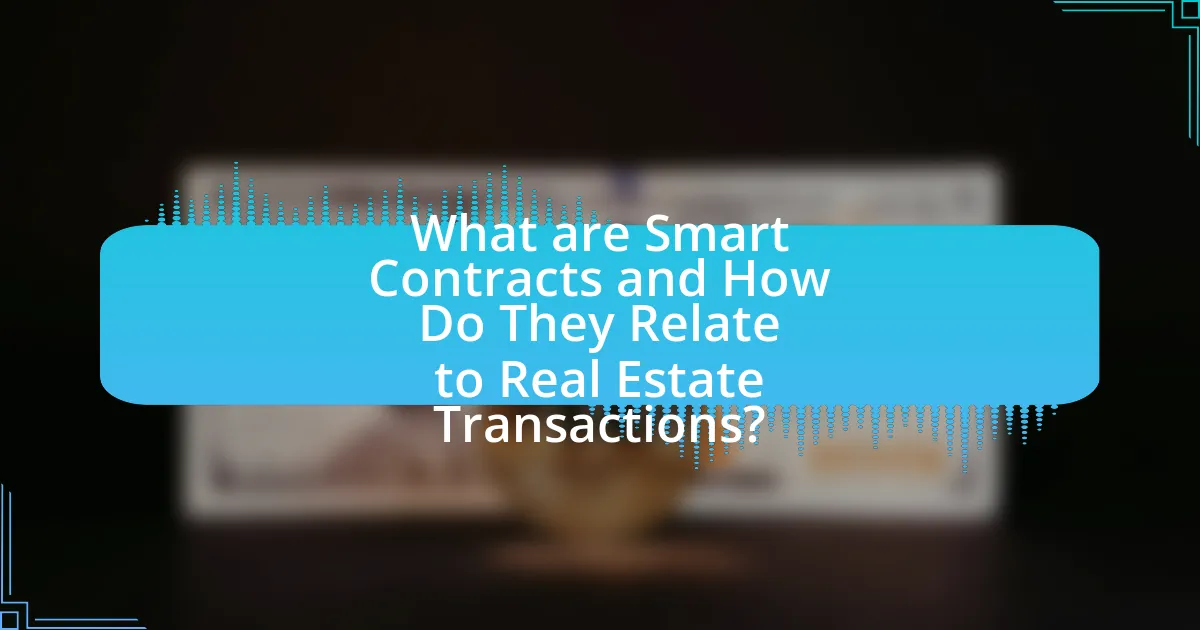
What are Smart Contracts and How Do They Relate to Real Estate Transactions?
Smart contracts are self-executing contracts with the terms of the agreement directly written into code, operating on blockchain technology. In real estate transactions, smart contracts automate processes such as property transfers, ensuring that conditions are met before executing the transaction, which reduces the need for intermediaries like lawyers and notaries. For instance, a smart contract can automatically transfer ownership of a property once payment is confirmed, enhancing efficiency and security. The use of smart contracts in real estate can lead to faster transactions, lower costs, and increased transparency, as all parties can access the same immutable records on the blockchain.
How do smart contracts function in the context of real estate?
Smart contracts function in real estate by automating and securing transactions through self-executing agreements coded on blockchain technology. These contracts facilitate processes such as property transfers, lease agreements, and escrow services without the need for intermediaries, thereby reducing costs and increasing efficiency. For instance, when a buyer and seller agree on a property sale, a smart contract can automatically execute the transfer of ownership once predefined conditions, such as payment confirmation, are met. This automation minimizes the risk of fraud and ensures transparency, as all transaction details are recorded on an immutable ledger. According to a report by Deloitte, the use of smart contracts in real estate can streamline transactions, potentially reducing the time taken for property transfers from weeks to mere minutes.
What are the key components of a smart contract in real estate?
The key components of a smart contract in real estate include the contract terms, digital signatures, automated execution, and blockchain technology. Contract terms define the obligations and rights of the parties involved, ensuring clarity and legal enforceability. Digital signatures authenticate the identities of the parties, providing security and integrity to the agreement. Automated execution allows for the automatic fulfillment of contract conditions, reducing the need for intermediaries and minimizing delays. Blockchain technology underpins the entire process, offering a decentralized and tamper-proof ledger that enhances transparency and trust in real estate transactions. These components collectively streamline the transaction process, reduce costs, and mitigate risks associated with traditional real estate dealings.
How do smart contracts ensure transparency in real estate transactions?
Smart contracts ensure transparency in real estate transactions by automating and recording all terms and conditions on a blockchain, which is an immutable ledger. This technology allows all parties involved to access the same information in real-time, reducing the risk of fraud and miscommunication. For instance, once a smart contract is executed, the transaction details are permanently stored on the blockchain, making it impossible to alter without consensus from all parties. This level of transparency is supported by the fact that blockchain technology provides a clear audit trail, allowing stakeholders to verify the authenticity of the transaction history at any time.
What advantages do smart contracts offer in real estate transactions?
Smart contracts offer several advantages in real estate transactions, including increased efficiency, reduced costs, and enhanced security. These digital agreements automate processes such as property transfers and payment settlements, minimizing the need for intermediaries like brokers and lawyers, which can significantly lower transaction costs. According to a study by the World Economic Forum, the use of blockchain technology, which underpins smart contracts, could reduce transaction costs by up to 10% in real estate. Additionally, smart contracts enhance security by utilizing cryptographic techniques that ensure data integrity and reduce the risk of fraud, as transactions are recorded on a tamper-proof ledger. This combination of efficiency, cost-effectiveness, and security positions smart contracts as a transformative force in the real estate sector.
How do smart contracts reduce transaction costs in real estate?
Smart contracts reduce transaction costs in real estate by automating processes and eliminating intermediaries. By utilizing blockchain technology, smart contracts facilitate direct transactions between parties, which minimizes the need for agents, lawyers, and other third parties that typically charge fees. For instance, a study by the World Economic Forum estimates that blockchain technology could reduce transaction costs in real estate by up to 30% by streamlining processes such as title transfers and escrow services. This efficiency not only lowers costs but also accelerates transaction times, making real estate deals more accessible and affordable.
What role do smart contracts play in expediting the closing process?
Smart contracts significantly expedite the closing process by automating and streamlining transactions. They eliminate the need for intermediaries, reducing time delays associated with manual processes. For instance, smart contracts execute predefined conditions automatically, ensuring that funds and property titles are transferred instantly upon meeting contractual obligations. This automation can reduce closing times from weeks to mere hours, as evidenced by a study from the National Association of Realtors, which found that transactions utilizing blockchain technology, including smart contracts, can close up to 50% faster than traditional methods.
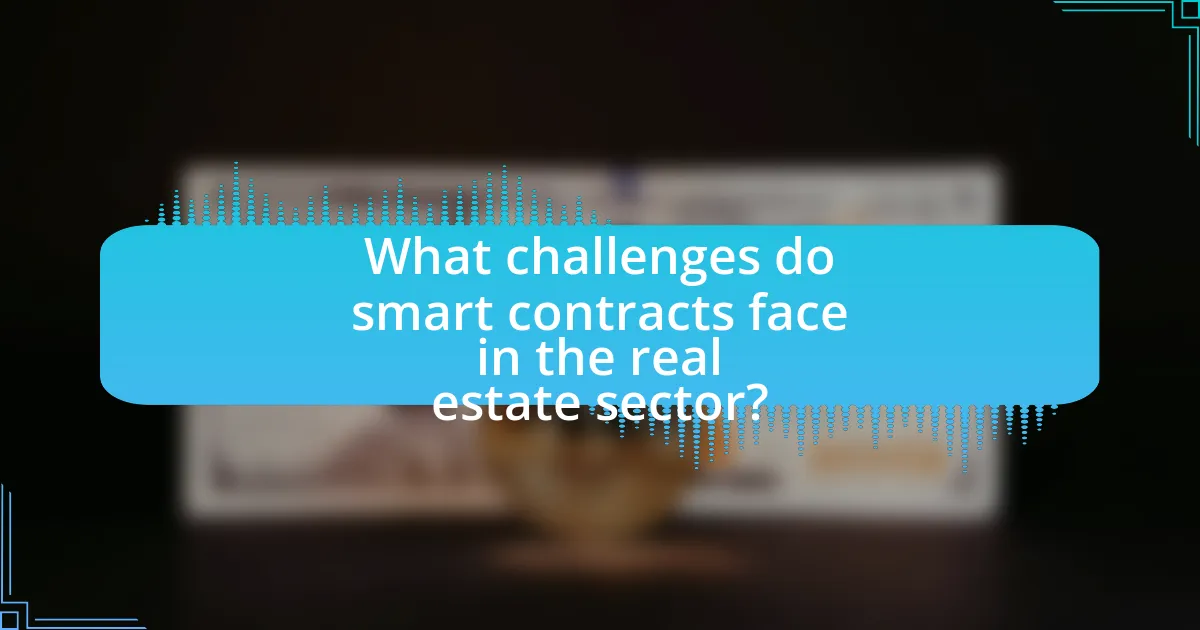
What challenges do smart contracts face in the real estate sector?
Smart contracts face several challenges in the real estate sector, including legal recognition, interoperability, and scalability. Legal recognition is crucial because many jurisdictions do not yet recognize smart contracts as legally binding, which can hinder their adoption in real estate transactions. Interoperability poses a challenge as different blockchain platforms may not communicate effectively, complicating transactions that involve multiple parties or systems. Scalability issues arise from the need to process a high volume of transactions quickly, which can be problematic on certain blockchain networks. These challenges must be addressed to fully realize the potential of smart contracts in streamlining real estate transactions.
What legal considerations must be addressed for smart contracts in real estate?
Legal considerations for smart contracts in real estate include compliance with existing property laws, enforceability of contract terms, and the need for clear identification of parties involved. Smart contracts must adhere to local regulations governing real estate transactions, ensuring they meet legal standards for validity. Additionally, the terms encoded in the smart contract must be unambiguous to avoid disputes, as courts may need to interpret these terms in case of a disagreement. Furthermore, the parties involved must be clearly defined to establish accountability and ownership rights, as ambiguity can lead to legal challenges.
How do current regulations impact the adoption of smart contracts?
Current regulations significantly hinder the adoption of smart contracts by imposing legal uncertainties and compliance challenges. Regulatory frameworks often lack clarity regarding the legal status of smart contracts, leading to concerns about enforceability and liability. For instance, in jurisdictions where traditional contract law does not explicitly recognize digital agreements, parties may hesitate to utilize smart contracts in real estate transactions. Additionally, regulations related to data privacy, anti-money laundering, and consumer protection can complicate the implementation of smart contracts, as they may require additional disclosures or compliance measures that are not inherently built into the technology. This regulatory landscape creates a cautious environment, slowing down the integration of smart contracts into mainstream real estate practices.
What are the potential risks associated with smart contracts in real estate?
The potential risks associated with smart contracts in real estate include coding errors, legal enforceability issues, and security vulnerabilities. Coding errors can lead to unintended consequences, as smart contracts operate based on the code written, which may contain bugs or flaws. Legal enforceability issues arise because the regulatory framework for smart contracts is still evolving, potentially leading to disputes over contract terms. Security vulnerabilities pose a significant risk, as smart contracts can be susceptible to hacking or exploitation, which can result in financial losses. According to a report by the World Economic Forum, the lack of standardization and regulatory clarity in blockchain technology further exacerbates these risks, highlighting the need for robust legal frameworks and security measures in real estate transactions involving smart contracts.
How can stakeholders overcome challenges related to smart contracts?
Stakeholders can overcome challenges related to smart contracts by implementing comprehensive legal frameworks and enhancing technical literacy. Establishing clear legal guidelines ensures that smart contracts are recognized and enforceable within existing legal systems, thereby reducing ambiguity and potential disputes. For instance, jurisdictions like Wyoming have enacted laws specifically addressing the legal status of smart contracts, providing a model for others to follow. Additionally, increasing technical literacy among stakeholders, including real estate professionals and legal advisors, enables them to better understand and utilize smart contracts effectively, minimizing errors and fostering trust in the technology. Research indicates that education and training programs can significantly improve stakeholder confidence and competence in using smart contracts, leading to smoother transactions and reduced friction in the adoption process.
What best practices can be implemented for successful smart contract integration?
Successful smart contract integration can be achieved by implementing best practices such as thorough testing, clear documentation, and adherence to security protocols. Thorough testing ensures that the smart contract functions as intended under various scenarios, reducing the risk of errors that could lead to financial loss. Clear documentation provides a comprehensive understanding of the contract’s functionality and terms, facilitating better communication among stakeholders. Adhering to security protocols, such as conducting audits and using established frameworks, protects against vulnerabilities and exploits. These practices are essential for building trust and ensuring the reliability of smart contracts in real estate transactions.
How can education and awareness improve the adoption of smart contracts?
Education and awareness can significantly improve the adoption of smart contracts by equipping stakeholders with the necessary knowledge to understand their benefits and functionalities. When real estate professionals, investors, and consumers are educated about smart contracts, they become more confident in utilizing this technology, which can streamline transactions, reduce costs, and enhance security. For instance, a survey by Deloitte found that 39% of executives believe that a lack of understanding is a major barrier to blockchain adoption, indicating that targeted educational initiatives could address this gap. Furthermore, awareness campaigns can demystify the technology, showcasing successful case studies and practical applications in real estate, thereby fostering trust and encouraging widespread implementation.
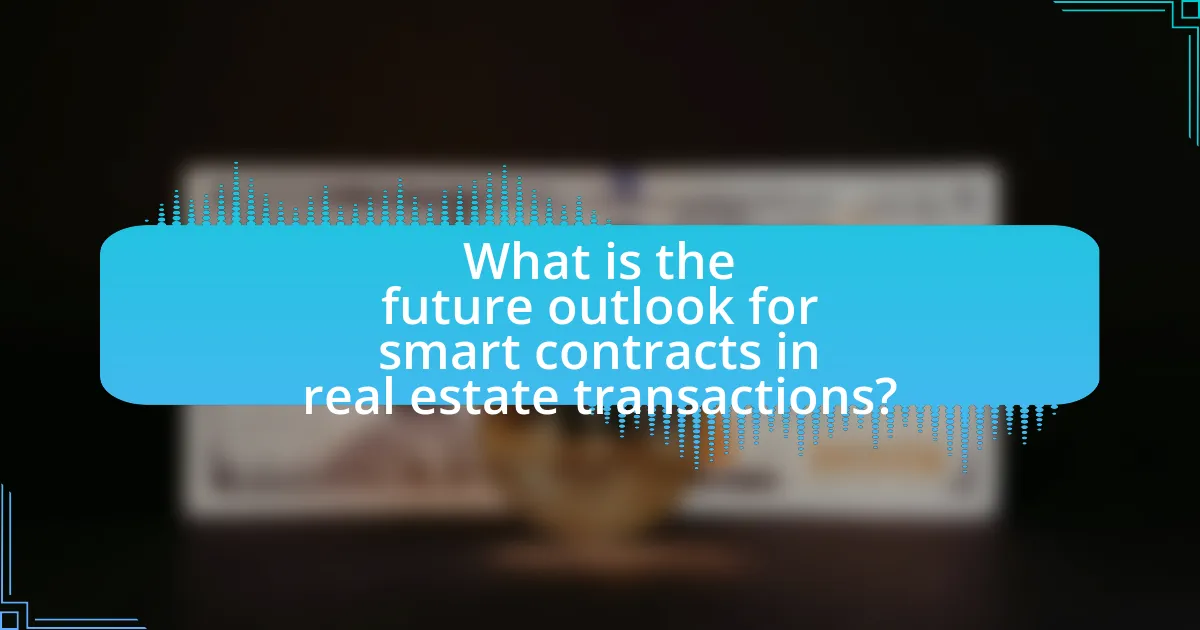
What is the future outlook for smart contracts in real estate transactions?
The future outlook for smart contracts in real estate transactions is highly promising, as they are expected to streamline processes, reduce costs, and enhance transparency. Smart contracts automate the execution of agreements when predefined conditions are met, which can significantly decrease the time and resources required for property transactions. According to a report by Deloitte, the adoption of blockchain technology, which underpins smart contracts, could save the real estate industry up to $1 trillion annually by reducing fraud and improving efficiency. As regulatory frameworks evolve to accommodate this technology, the integration of smart contracts is likely to become more prevalent, transforming traditional real estate practices.
How might technological advancements influence smart contracts in real estate?
Technological advancements will significantly enhance the functionality and efficiency of smart contracts in real estate by enabling automation, improving security, and facilitating interoperability. For instance, the integration of blockchain technology allows for immutable records and transparent transactions, reducing the risk of fraud and disputes. Additionally, advancements in artificial intelligence can automate the verification of contract terms and conditions, streamlining the transaction process. According to a report by Deloitte, the use of blockchain in real estate transactions can reduce transaction costs by up to 30% and increase transaction speed by eliminating intermediaries. These advancements collectively position smart contracts as a transformative tool in real estate, promoting greater trust and efficiency in property transactions.
What emerging technologies could enhance smart contract functionality?
Emerging technologies that could enhance smart contract functionality include artificial intelligence, blockchain interoperability, and the Internet of Things (IoT). Artificial intelligence can automate decision-making processes within smart contracts, improving efficiency and reducing human error. Blockchain interoperability allows different blockchain networks to communicate, enabling more complex and versatile smart contracts that can operate across various platforms. The Internet of Things can facilitate real-time data integration into smart contracts, allowing them to execute based on live data inputs, such as property conditions or market changes. These technologies collectively contribute to more robust, adaptable, and efficient smart contracts in real estate transactions.
How will the integration of blockchain technology shape the future of real estate transactions?
The integration of blockchain technology will revolutionize real estate transactions by enhancing transparency, security, and efficiency. Blockchain’s decentralized ledger allows for immutable records of property ownership and transaction history, reducing fraud and disputes. For instance, a study by Deloitte highlights that blockchain can streamline the closing process, cutting transaction times from weeks to days by automating tasks through smart contracts. Additionally, the use of blockchain can lower transaction costs by eliminating intermediaries, as evidenced by the success of platforms like Propy, which facilitates cross-border real estate transactions using blockchain.
What practical steps can real estate professionals take to leverage smart contracts?
Real estate professionals can leverage smart contracts by integrating blockchain technology into their transaction processes. This integration allows for automated, secure, and transparent agreements that reduce the need for intermediaries. By utilizing platforms like Ethereum, real estate agents can create smart contracts that automatically execute terms when conditions are met, such as transferring ownership upon payment completion.
Additionally, professionals can educate themselves on coding basics or collaborate with blockchain developers to customize smart contracts for specific transactions, ensuring they meet legal requirements and industry standards. The adoption of smart contracts can lead to faster closings and reduced transaction costs, as evidenced by a study from the World Economic Forum, which estimates that blockchain technology could save the real estate industry up to $1 trillion annually by streamlining processes and reducing fraud.
How can real estate agents prepare for the adoption of smart contracts?
Real estate agents can prepare for the adoption of smart contracts by educating themselves on blockchain technology and its implications for real estate transactions. Understanding how smart contracts automate processes, reduce fraud, and enhance transparency is crucial. Agents should also familiarize themselves with relevant legal frameworks and regulations governing smart contracts in their jurisdiction, as these can vary significantly. Additionally, collaborating with technology providers to integrate smart contract solutions into their existing systems will facilitate a smoother transition. According to a report by Deloitte, 40% of real estate professionals believe that blockchain will significantly impact the industry, highlighting the importance of proactive adaptation to this technology.
What resources are available for learning about smart contracts in real estate?
Resources for learning about smart contracts in real estate include online courses, academic papers, and industry reports. Platforms like Coursera and Udemy offer courses specifically focused on blockchain technology and smart contracts, often featuring modules on real estate applications. Academic papers, such as “Smart Contracts: Legal Framework and Applications” by D. A. D. M. de Lima and J. M. de Oliveira, provide in-depth analysis and case studies. Additionally, industry reports from organizations like the World Economic Forum and Deloitte discuss the implications of smart contracts in real estate, offering valuable insights and data. These resources collectively enhance understanding of how smart contracts can transform real estate transactions.

